Knowledge Structure and Evolution of Wetland Plant Diversity Research: Visual Exploration Based on CiteSpace
Simple Summary
Abstract
1. Introduction
2. Data and Methodology
2.1. Data Collection and Search Strategies
2.2. Analytical Methods
3. Results and Discussion
3.1. Publications and Annual Growth
3.2. Subject Area Distribution
3.3. Core Journals and Literature
3.4. Core Authors
3.5. Countries and Institutions
3.6. Keywords
3.7. Prospects of Wetland Plant Diversity Research
3.8. Limitations
4. Conclusions
Author Contributions
Funding
Institutional Review Board Statement
Informed Consent Statement
Data Availability Statement
Conflicts of Interest
References
- Xu, X.; Chen, M.; Yang, G.; Jiang, B.; Zhang, J. Wetland ecosystem services research: A critical review. Glob. Ecol. Conserv. 2020, 22, e01027. [Google Scholar] [CrossRef]
- Sun, W.; Chen, D.; Li, Z.; Li, S.; Cheng, S.; Niu, X.; Cai, Y.; Shi, Z.; Wu, C.; Yang, G.; et al. Monitoring wetland plant diversity from space: Progress and perspective. Int. J. Appl. Earth Obs. Geoinf. 2024, 130, 103943. [Google Scholar] [CrossRef]
- Chen, Y.; Sun, L.; Xu, J.; Liang, B.; Wang, J.; Xiong, N. Wetland vegetation changes in response to climate change and human activities on the Tibetan Plateau during 2000–2015. Front. Ecol. Evol. 2023, 11, 1113802. [Google Scholar] [CrossRef]
- Zedler, J.B.; Kercher, S. WETLAND RESOURCES: Status, Trends, Ecosystem Services, and Restorability. Annu. Rev. Environ. Resour. 2005, 30, 39–74. [Google Scholar] [CrossRef]
- Korol, A.R.; Ahn, C.; Noe, G.B. Richness, biomass, and nutrient content of a wetland macrophyte community affect soil nitrogen cycling in a diversity-ecosystem functioning experiment. Ecol. Eng. 2016, 95, 252–265. [Google Scholar] [CrossRef]
- Brisson, J.; Rodriguez, M.; Martin, C.A.; Proulx, R. Plant diversity effect on water quality in wetlands: A meta-analysis based on experimental systems. Ecol. Appl. 2020, 30, e02074. [Google Scholar] [CrossRef]
- Janousek, C.N.; Folger, C.L.; Halvorsen, R. Variation in tidal wetland plant diversity and composition within and among coastal estuaries: Assessing the relative importance of environmental gradients. J. Veg. Sci. 2013, 25, 534–545. [Google Scholar] [CrossRef]
- Flinn, K.M.; Lechowicz, M.J.; Waterway, M.J. Plant species diversity and composition of wetlands within an upland forest. Am. J. Bot. 2008, 95, 1216–1224. [Google Scholar] [CrossRef]
- Suárez, F.; Sarabia, A.; Sanzana, P.; Latorre, C.; Muñoz, J.F. The Quebrada Negra wetland study: An approach to understand plant diversity, hydrology, and hydrogeology of high-Andean wetlands. WIREs Water 2023, 11, e1683. [Google Scholar] [CrossRef]
- Zheng, J.; Arif, M.; He, X.; Liu, X.; Li, C. Distinguishing the mechanisms driving multifaceted plant diversity in subtropical reservoir riparian zones. Front. Plant Sci. 2023, 14, 1138368. [Google Scholar] [CrossRef]
- Zedler, J.B. Progress in wetland restoration ecology. Trends Ecol. Evol. 2000, 15, 402–407. [Google Scholar] [CrossRef] [PubMed]
- Guo, M.; Li, J.; Sheng, C.; Xu, J.; Wu, L. A Review of Wetland Remote Sensing. Sensors 2017, 17, 777. [Google Scholar] [CrossRef] [PubMed]
- Williams, L.D.; Ahn, C. Plant community development as affected by initial planting richness in created mesocosm wetlands. Ecol. Eng. 2015, 75, 33–40. [Google Scholar] [CrossRef]
- Salaria, S.; Howard, R.; Clare, S.; Creed, I.F. Incomplete recovery of plant diversity in restored prairie wetlands on agricultural landscapes. Restor. Ecol. 2018, 27, 520–530. [Google Scholar] [CrossRef]
- Keddy, P. Putting the Plants Back into Plant Ecology: Six Pragmatic Models for Understanding and Conserving Plant Diversity. Ann. Bot. 2005, 96, 177–189. [Google Scholar] [CrossRef]
- Schultz, R.; Andrews, S.; O’Reilly, L.; Bouchard, V.; Frey, S. Plant Community Composition More Predictive than Diversity of Carbon Cycling in Freshwater Wetlands. Wetlands 2011, 31, 965–977. [Google Scholar] [CrossRef]
- Wang, X.; Tong, S.; Li, Y.; Qi, Q.; Zhang, D.; Lyu, X.; Guo, Y.; Liu, Y. Plant Diversity Performance After Natural Restoration in Reclaimed Deyeuxia angustifolia Wetland. Chin. Geogr. Sci. 2019, 29, 437–445. [Google Scholar] [CrossRef]
- Gaberščik, A.; Krek, J.L.; Zelnik, I. Habitat diversity along a hydrological gradient in a complex wetland results in high plant species diversity. Ecol. Eng. 2018, 118, 84–92. [Google Scholar] [CrossRef]
- Hurtado, A.B.; Echeverry-Galvis, M.Á.; Salgado-Negret, B.; Muñoz, J.C.; Posada, J.M.; Norden, N.; McMichael, C. Little trace of floristic homogenization in peri-urban Andean secondary forests despite high anthropogenic transformation. J. Ecol. 2020, 109, 1468–1478. [Google Scholar] [CrossRef]
- Yuan, Z.; Xiao, M.; Su, X.; Zhao, H.; Li, Y.; Zhang, H.; Zhou, Z.; Qi, R.; Chen, Y.; Wang, W. Effects of Environment and Human Activities on Plant Diversity in Wetlands along the Yellow River in Henan Province, China. Diversity 2022, 14, 470. [Google Scholar] [CrossRef]
- Xiong, Y.; Mo, S.; Wu, H.; Qu, X.; Liu, Y.; Zhou, L. Influence of human activities and climate change on wetland landscape pattern—A review. Sci. Total Environ. 2023, 879, 163112. [Google Scholar] [CrossRef]
- Sullivan, T.P.; Sullivan, D.S. Vegetation management and ecosystem disturbance: Impact of glyphosate herbicide on plant and animal diversity in terrestrial systems. Environ. Rev. 2003, 11, 37–59. [Google Scholar] [CrossRef]
- Wen, L.; Mason, T.J.; Ryan, S.; Ling, J.E.; Saintilan, N.; Rodriguez, J. Monitoring long-term vegetation condition dynamics in persistent semi-arid wetland communities using time series of Landsat data. Sci. Total Environ. 2023, 905, 167212. [Google Scholar] [CrossRef]
- Sun, M.; Zhang, X.; Jin, R. Visualization of Post-Fire Remote Sensing Using CiteSpace: A Bibliometric Analysis. Forests 2025, 16, 592. [Google Scholar] [CrossRef]
- Yang, H.; Shao, X.; Wu, M. A Review on Ecosystem Health Research: A Visualization Based on CiteSpace. Sustainability 2019, 11, 4908. [Google Scholar] [CrossRef]
- Wu, L.; Miao, H.; Liu, T. Development in Agricultural Ecosystems’ Carbon Emissions Research: A Visual Analysis Using CiteSpace. Agronomy 2024, 14, 1288. [Google Scholar] [CrossRef]
- Jia, F.; Sun, D.; Looi, C.-k. Artificial Intelligence in Science Education (2013–2023): Research Trends in Ten Years. J. Sci. Educ. Technol. 2023, 33, 94–117. [Google Scholar] [CrossRef]
- Pennings, S.C.; Callaway, R.M. Impact of a Parasitic Plant on the Structure and Dynamics of Salt Marsh Vegetation. Ecology 1996, 77, 1410–1419. [Google Scholar] [CrossRef]
- Chen, C. Searching for intellectual turning points: Progressive knowledge domain visualization. Proc. Natl. Acad. Sci. USA 2004, 101, 5303–5310. [Google Scholar] [CrossRef]
- Liu, Z.; Qiu, Z. A systematic review of transportation carbon emissions based on CiteSpace. Environ. Sci. Pollut. Res. 2023, 30, 54362–54384. [Google Scholar] [CrossRef]
- Zobel, M. Plant Species Coexistence: The Role of Historical, Evolutionary and Ecological Factors. Oikos 1992, 65, 314–320. [Google Scholar] [CrossRef]
- Eriksson, O. The Species-Pool Hypothesis and Plant Community Diversity. Oikos 1993, 68, 371–374. [Google Scholar] [CrossRef]
- Xiong, S.; Johansson, M.E.; Hughes, F.M.R.; Hayes, A.; Richards, K.S.; Nilsson, C. Interactive effects of soil moisture, vegetation canopy, plant litter and seed addition on plant diversity in a wetland community. J. Ecol. 2003, 91, 976–986. [Google Scholar] [CrossRef]
- Engelhardt, K.A.M.; Ritchie, M.E. Effects of macrophyte species richness on wetland ecosystem functioning and services. Nature 2001, 411, 687–689. [Google Scholar] [CrossRef]
- Shackleton, M.E.; Rees, G.N.; Watson, G.; Campbell, C.; Nielsen, D. Environmental DNA reveals landscape mosaic of wetland plant communities. Glob. Ecol. Conserv. 2019, 19, e00689. [Google Scholar] [CrossRef]
- Means, M.M.; Ahn, C.; Korol, A.R.; Williams, L.D. Carbon storage potential by four macrophytes as affected by planting diversity in a created wetland. J. Environ. Manag. 2016, 165, 133–139. [Google Scholar] [CrossRef]
- Zhao, Y.W.; Liu, Y.X.; Wu, S.R.; Li, Z.M.; Zhang, Y.; Qin, Y.; Yin, X.A. Construction and application of an aquatic ecological model for an emergent-macrophyte-dominated wetland: A case of Hanshiqiao wetland. Ecol. Eng. 2016, 96, 214–223. [Google Scholar] [CrossRef]
- Wingard, G.L.; Lorenz, J.J. Integrated conceptual ecological model and habitat indices for the southwest Florida coastal wetlands. Ecol. Indic. 2014, 44, 92–107. [Google Scholar] [CrossRef]
- Seifollahi-Aghmiuni, S.; Nockrach, M.; Kalantari, Z. The Potential of Wetlands in Achieving the Sustainable Development Goals of the 2030 Agenda. Water 2019, 11, 609. [Google Scholar] [CrossRef]
- Sati, P.; Chandola, V.; Chandra, S.; Trivedi, V.L.; Purohit, V.K.; Nautiyal, M.C. Global environmental change mediated response of wetland plants: Evidence from past decades. Sci. Total Environ. 2025, 966, 178668. [Google Scholar] [CrossRef]
- Sun, J.; Yuan, X.; Liu, G.; Ren, R. The evaluation of wetland reconstruction with nature-based solutions for eco-economic sustainable development. Ecol. Indic. 2024, 160, 111936. [Google Scholar] [CrossRef]
- Moges, A.; Beyene, A.; Ambelu, A.; Mereta, S.T.; Triest, L.; Kelbessa, E. Plant species composition and diversity in wetlands under forest, agriculture and urban land uses. Aquat. Bot. 2017, 138, 9–15. [Google Scholar] [CrossRef]
- Wang, Y.-F.; Gu, J.-D. Higher diversity of ammonia/ammonium-oxidizing prokaryotes in constructed freshwater wetland than natural coastal marine wetland. Appl. Microbiol. Biotechnol. 2012, 97, 7015–7033. [Google Scholar] [CrossRef]
- Thompson, Y.; D’Angelo, E.M.; Karathanasis, A.D.; Sandefur, B.C. Plant community composition as a function of geochemistry and hydrology in three Appalachian wetlands. Ecohydrology 2011, 5, 389–400. [Google Scholar] [CrossRef]
- Zhou, D.; Luan, Z.; Guo, X.; Lou, Y. Spatial distribution patterns of wetland plants in relation to environmental gradient in the Honghe National Nature Reserve, Northeast China. J. Geogr. Sci. 2012, 22, 57–70. [Google Scholar] [CrossRef]
- Kim, S.; Kang, H.; Megonigal, J.P.; McCormick, M. Microbial Activity and Diversity Vary with Plant Diversity and Biomass in Wetland Ecosystems. Estuaries Coasts 2021, 45, 1434–1444. [Google Scholar] [CrossRef]
- Simon, M.F.; Grether, R.; de Queiroz, L.P.; Skema, C.; Pennington, R.T.; Hughes, C.E. Recent assembly of the Cerrado, a neotropical plant diversity hotspot, by in situ evolution of adaptations to fire. Proc. Natl. Acad. Sci. USA 2009, 106, 20359–20364. [Google Scholar] [CrossRef] [PubMed]
- Brinson, M.M.; Malvárez, A.I. Temperate freshwater wetlands: Types, status, and threats. Environ. Conserv. 2002, 29, 115–133. [Google Scholar] [CrossRef]
- Bedford, B.L.; Walbridge, M.R.; Aldous, A. Patterns in Nutrient Availability and Plant Diversity of Temperate North American Wetlands. Ecology 1999, 80, 2151–2169. [Google Scholar] [CrossRef]
- Pollock, M.M.; Naiman, R.J.; Hanley, T.A. Plant Species Richness in Riparian Wetlands—A Test of Biodiversity Theory. Ecology 1998, 79, 94–105. [Google Scholar] [CrossRef]
- Thorslund, J.; Jarsjo, J.; Jaramillo, F.; Jawitz, J.W.; Manzoni, S.; Basu, N.B.; Chalov, S.R.; Cohen, M.J.; Creed, I.F.; Goldenberg, R.; et al. Wetlands as large-scale nature-based solutions: Status and challenges for research, engineering and management. Ecol. Eng. 2017, 108, 489–497. [Google Scholar] [CrossRef]
- Jiao, S.; Xu, Y.; Zhang, J.; Hao, X.; Lu, Y.; Shade, A. Core Microbiota in Agricultural Soils and Their Potential Associations with Nutrient Cycling. mSystems 2019, 4, e00313-18. [Google Scholar] [CrossRef] [PubMed]
- Houlahan, J.E.; Keddy, P.A.; Makkay, K.; Findlay, C.S. The effects of adjacent land use on wetland species richness and community composition. Wetlands 2006, 26, 79–96. [Google Scholar] [CrossRef]
- Mohamed, D.J.; Martiny, J.B.H. Patterns of fungal diversity and composition along a salinity gradient. ISME J. 2011, 5, 379–388. [Google Scholar] [CrossRef]
- Hu, L.; Zhu, H.; Liao, Q.; Qu, B.; Gao, R.; Tao, R.; Fu, M. Visual analysis of coal fire detection research based on bibliometrics. Int. J. Remote Sens. 2023, 44, 5976–6011. [Google Scholar] [CrossRef]
- Daleo, P.; Alberti, J.; Pascual, J.; Canepuccia, A.; Iribarne, O. Herbivory affects salt marsh succession dynamics by suppressing the recovery of dominant species. Oecologia 2014, 175, 335–343. [Google Scholar] [CrossRef]
- Alberti, J.; Canepuccia, A.; Pascual, J.; Pérez, C.; Iribarne, O. Joint control by rodent herbivory and nutrient availability of plant diversity in a salt marsh-salty steppe transition zone. J. Veg. Sci. 2011, 22, 216–224. [Google Scholar] [CrossRef]
- Zhang, A.; Ying, Z.; Hu, X.; Yu, M. Phylogenetic Diversity of Wetland Plants across China. Plants 2021, 10, 1850. [Google Scholar] [CrossRef]
- Zak, D.R.; Holmes, W.E.; White, D.C.; Peacock, A.D.; Tilman, D. Plant Diversity, Soil Microbial Communities, and Ecosystem Function: Are There Any Links? Ecology 2003, 84, 2042–2050. [Google Scholar] [CrossRef]
- Tilman, D.; Lehman, C. Human-caused environmental change: Impacts on plant diversity and evolution. Proc. Natl. Acad. Sci. USA 2001, 98, 5433–5440. [Google Scholar] [CrossRef]
- Thomas Clark, A.; Lehman, C.; Tilman, D.; Mayfield, M. Identifying mechanisms that structure ecological communities by snapping model parameters to empirically observed tradeoffs. Ecol. Lett. 2018, 21, 494–505. [Google Scholar] [CrossRef]
- Brock, M.A. Australian wetland plants and wetlands in the landscape: Conservation of diversity and future management. Aquat. Ecosyst. Health Manag. 2003, 6, 29–40. [Google Scholar] [CrossRef]
- Byun, C.; Nam, J.M.; Kim, J.G. Effects of flooding regime on wetland plant growth and species dominance in a mesocosm experiment. Plant Ecol. 2017, 218, 517–527. [Google Scholar] [CrossRef]
- Moor, H.; Rydin, H.; Hylander, K.; Nilsson, M.B.; Lindborg, R.; Norberg, J.; Vesk, P. Towards a trait-based ecology of wetland vegetation. J. Ecol. 2017, 105, 1623–1635. [Google Scholar] [CrossRef]
- Boileau, J.; Calvet, C.; Pioch, S.; Moulherat, S. Ecological equivalence assessment: The potential of genetic tools, remote sensing and metapopulation models to better apply the mitigation hierarchy. J. Environ. Manag. 2022, 305, 114415. [Google Scholar] [CrossRef]
- Taddeo, S.; Dronova, I.; Harris, K. The potential of satellite greenness to predict plant diversity among wetland types, ecoregions, and disturbance levels. Ecol. Appl. 2019, 29, e01961. [Google Scholar] [CrossRef]
- Sun, Y.; Huang, J.; Ao, Z.; Lao, D.; Xin, Q. Deep Learning Approaches for the Mapping of Tree Species Diversity in a Tropical Wetland Using Airborne LiDAR and High-Spatial-Resolution Remote Sensing Images. Forests 2019, 10, 1047. [Google Scholar] [CrossRef]
- Sharpe, P.J.; Baldwin, A.H. Patterns of wetland plant species richness across estuarine gradients of Chesapeake Bay. Wetlands 2009, 29, 225–235. [Google Scholar] [CrossRef]
- Wan, D.; Yu, P.; Kong, L.; Zhang, J.; Chen, Y.; Zhao, D.; Liu, J. Effects of inland salt marsh wetland degradation on plant community characteristics and soil properties. Ecol. Indic. 2024, 159, 111582. [Google Scholar] [CrossRef]
- Grace, J.B.; Pugesek, B.H. A Structural Equation Model of Plant Species Richness and Its Application to a Coastal Wetland. Am. Nat. 1997, 149, 436–460. [Google Scholar] [CrossRef]
- Short, F.T.; Kosten, S.; Morgan, P.A.; Malone, S.; Moore, G.E. Impacts of climate change on submerged and emergent wetland plants. Aquat. Bot. 2016, 135, 3–17. [Google Scholar] [CrossRef]
- Houlahan, J.E.; Findlay, C.S. Effect of Invasive Plant Species on Temperate Wetland Plant Diversity. Conserv. Biol. 2004, 18, 1132–1138. [Google Scholar] [CrossRef]
- Zhang, L.; Shao, H. Direct plant–plant facilitation in coastal wetlands: A review. Estuar. Coast. Shelf Sci. 2013, 119, 1–6. [Google Scholar] [CrossRef]
- Lu, X.; Wang, R. Study on wetland biodiversity in China. Chin. Geogr. Sci. 1995, 6, 15–23. [Google Scholar] [CrossRef]
- Yousaf, A.; Khalid, N.; Aqeel, M.; Noman, A.; Naeem, N.; Sarfraz, W.; Ejaz, U.; Qaiser, Z.; Khalid, A. Nitrogen Dynamics in Wetland Systems and Its Impact on Biodiversity. Nitrogen 2021, 2, 196–217. [Google Scholar] [CrossRef]
- Trebitz, A.S.; Taylor, D.L. Exotic and Invasive Aquatic Plants in Great Lakes Coastal Wetlands: Distribution and Relation to Watershed Land Use and Plant Richness and Cover. J. Great Lakes Res. 2007, 33, 705–721. [Google Scholar] [CrossRef]
- McGlynn, C.A. Native and invasive plant interactions in wetlands and the minimal role of invasiveness. Biol. Invasions 2008, 11, 1929–1939. [Google Scholar] [CrossRef]
- Zhao, R.; Zhang, X.; Zhang, L.; Wang, Y. Plant Diversity and Soil Properties at Different Wetland Restoration Stages along a Major River in the Arid Northwest of China. Wetlands 2021, 41, 13. [Google Scholar] [CrossRef]
- Cui, B.; Yang, Q.; Yang, Z.; Zhang, K. Evaluating the ecological performance of wetland restoration in the Yellow River Delta, China. Ecol. Eng. 2009, 35, 1090–1103. [Google Scholar] [CrossRef]
- Steenvoorden, J.; Leestemaker, N.; Kooij, D.; Crowley, W.; Fernandez, F.; Schouten, M.G.C.; Limpens, J. Towards standardised large-scale monitoring of peatland habitats through fine-scale drone-derived vegetation mapping. Ecol. Indic. 2024, 166, 112265. [Google Scholar] [CrossRef]
- Liu, N.; Li, Y.; Wang, Q.-c.; Zhou, R.; Gaffney, P.P.J.; Liu, M.; Shi, R.; Gao, Z.; Chu, H.; Niu, S.; et al. Restoration recovers plant diversity but changes species composition and biomass allocation in an alpine peatland. Ecol. Process. 2025, 14, 24. [Google Scholar] [CrossRef]
- Zelnik, I.; Čarni, A. Plant species diversity and composition of wet grasslands in relation to environmental factors. Biodivers. Conserv. 2013, 22, 2179–2192. [Google Scholar] [CrossRef]
- Cao, B.; Bai, C.; Xue, Y.; Yang, J.; Gao, P.; Liang, H.; Zhang, L.; Che, L.; Wang, J.; Xu, J.; et al. Wetlands rise and fall: Six endangered wetland species showed different patterns of habitat shift under future climate change. Sci. Total Environ. 2020, 731, 138518. [Google Scholar] [CrossRef] [PubMed]
- Zhang, H.; Mächler, E.; Morsdorf, F.; Niklaus, P.A.; Schaepman, M.E.; Altermatt, F. A spatial fingerprint of land-water linkage of biodiversity uncovered by remote sensing and environmental DNA. Sci. Total Environ. 2023, 867, 161365. [Google Scholar] [CrossRef]
- Skidmore, A.K.; Siegenthaler, A.; Wang, T.; Darvishzadeh, R.; Zhu, X.; Chariton, A.; Arjen de Groot, G. Mapping the relative abundance of soil microbiome biodiversity from eDNA and remote sensing. Sci. Remote Sens. 2022, 6, 100065. [Google Scholar] [CrossRef]
- Zhuo, W.; Wu, N.; Shi, R.; Liu, P.; Zhang, C.; Fu, X.; Cui, Y. Aboveground biomass retrieval of wetland vegetation at the species level using UAV hyperspectral imagery and machine learning. Ecol. Indic. 2024, 166, 112365. [Google Scholar] [CrossRef]
- Sun, H.; Xin, Q.; Ma, Z.; Lan, S. Effects of plant diversity on carbon dioxide emissions and carbon removal in laboratory-scale constructed wetland. Environ. Sci. Pollut. Res. 2019, 26, 5076–5082. [Google Scholar] [CrossRef]
- Liu, H.-B.; Yang, L.-P.; Gao, J.-Q.; Li, Q.-W.; Li, X.-L.; Feng, J.-G.; Yu, F.-H. Increasing plant diversity enhances soil organic carbon storage in typical wetlands of northern China. Front. Plant Sci. 2024, 15, 1467621. [Google Scholar] [CrossRef]
- Let, M.; Pal, S. Socio-ecological well-being perspectives of wetland loss scenario: A review. J. Environ. Manag. 2023, 326, 116692. [Google Scholar] [CrossRef]
- Dixon, A.; Carrie, R. Creating local institutional arrangements for sustainable wetland socio-ecological systems: Lessons from the ‘Striking a Balance’ project in Malawi. Int. J. Sustain. Dev. World Ecol. 2015, 23, 40–52. [Google Scholar] [CrossRef]
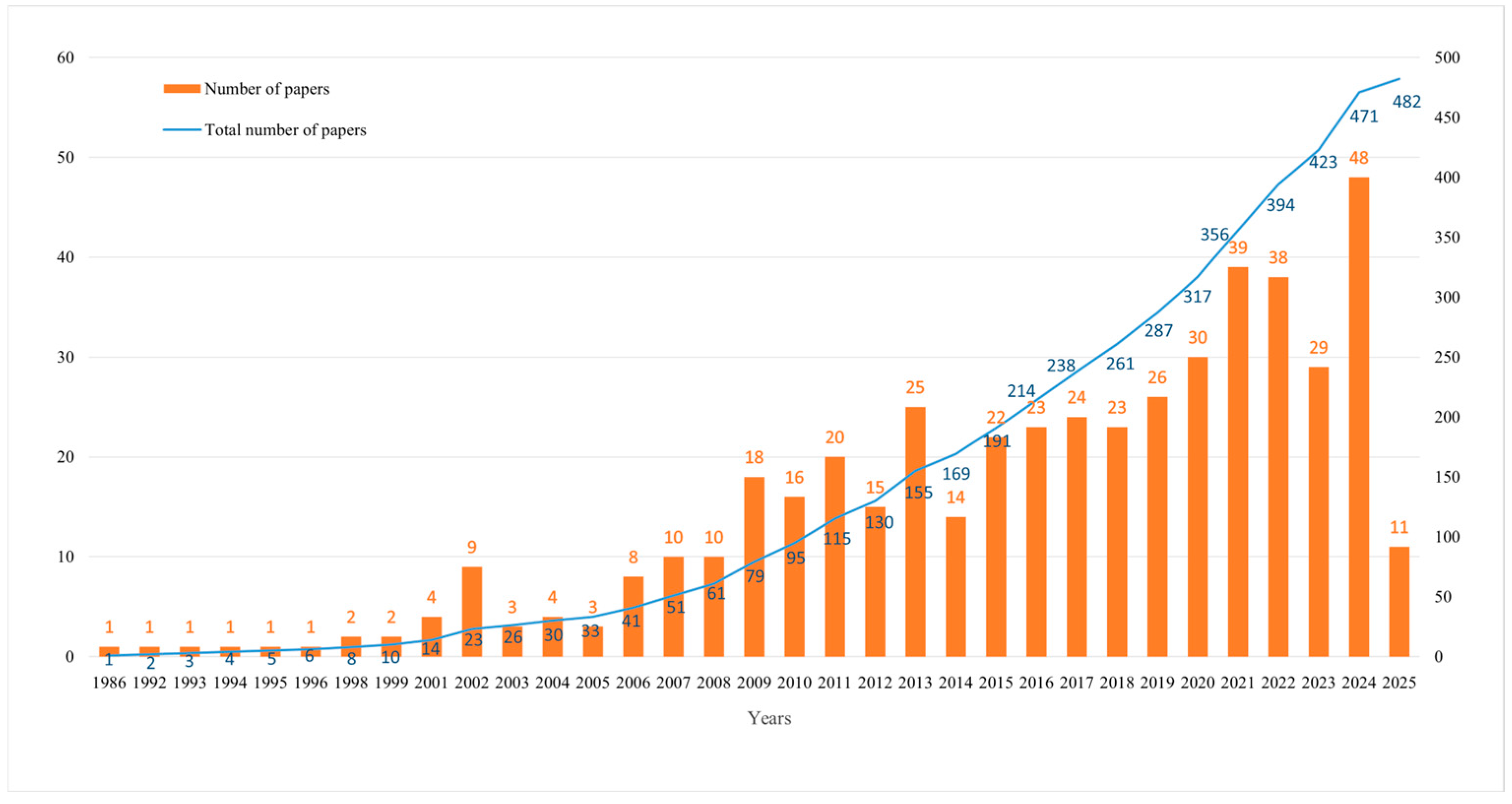
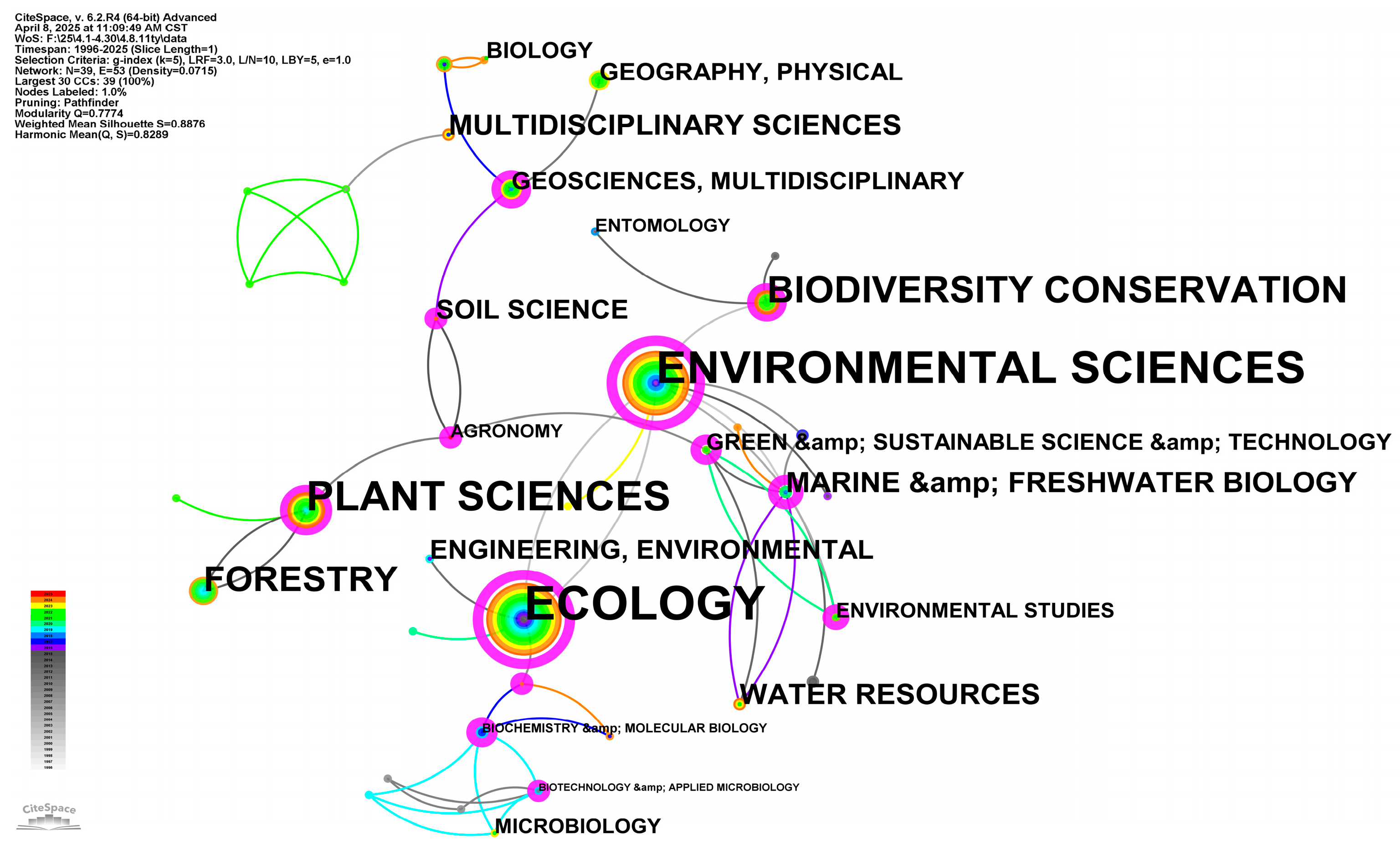
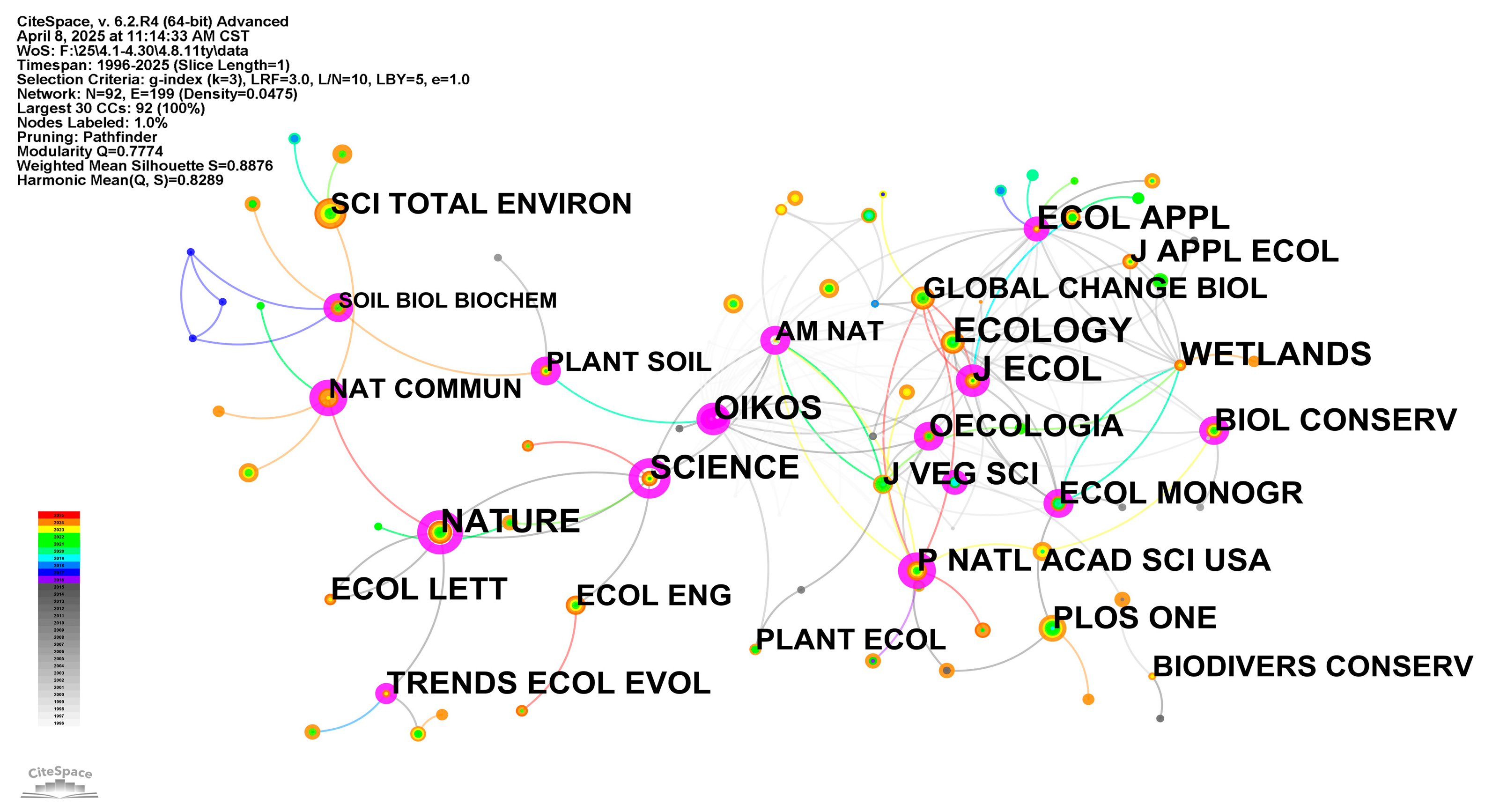
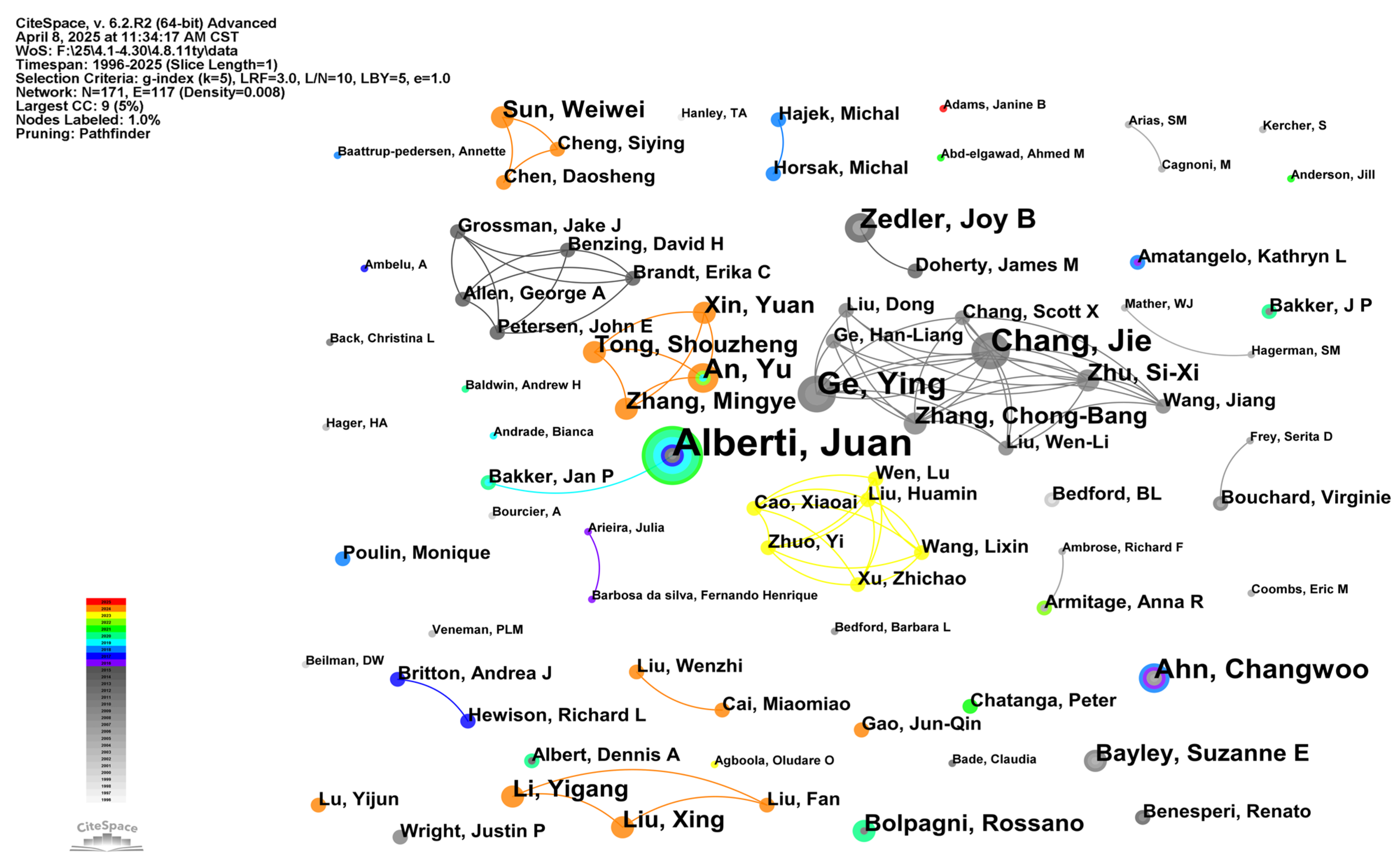
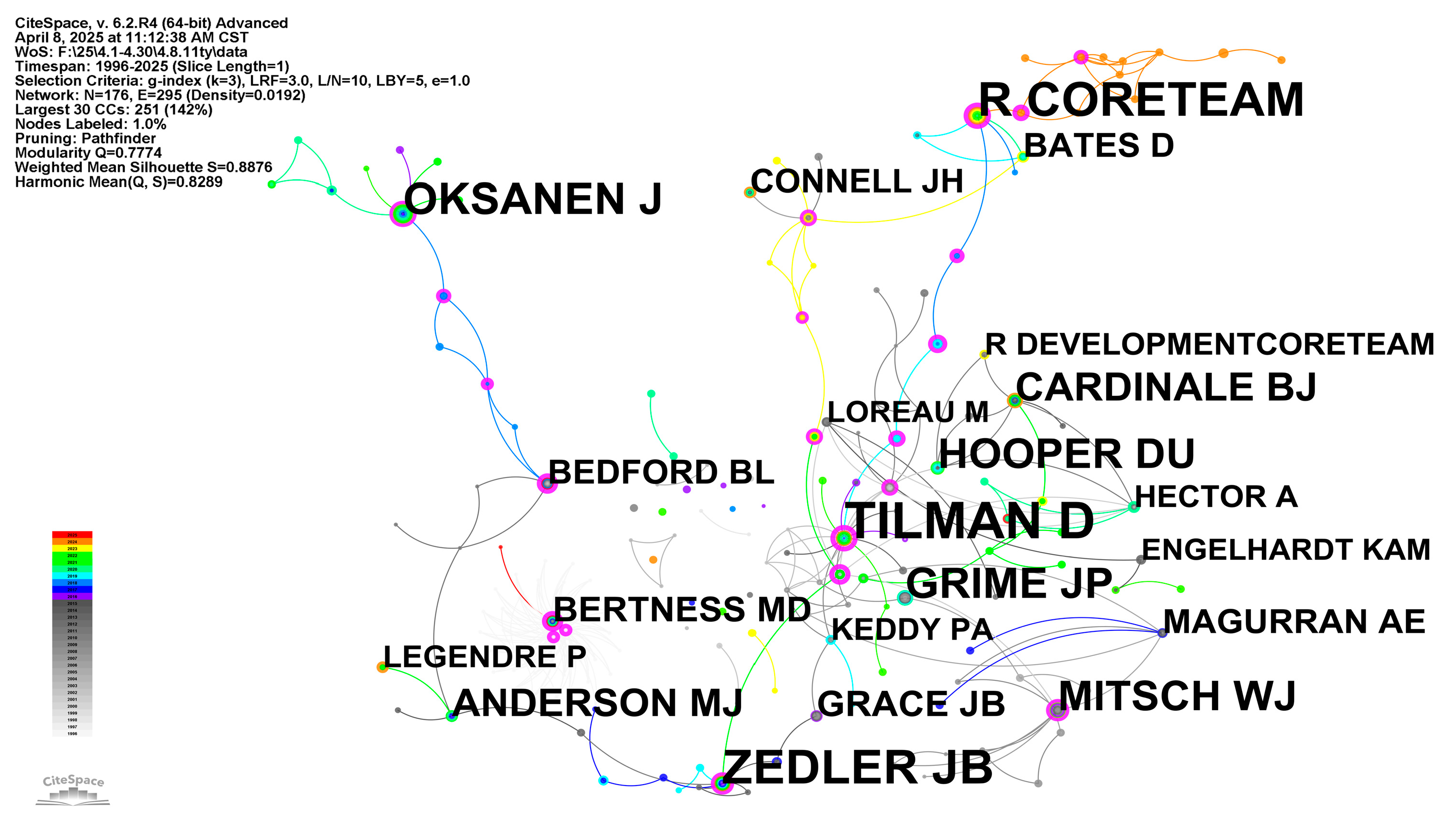
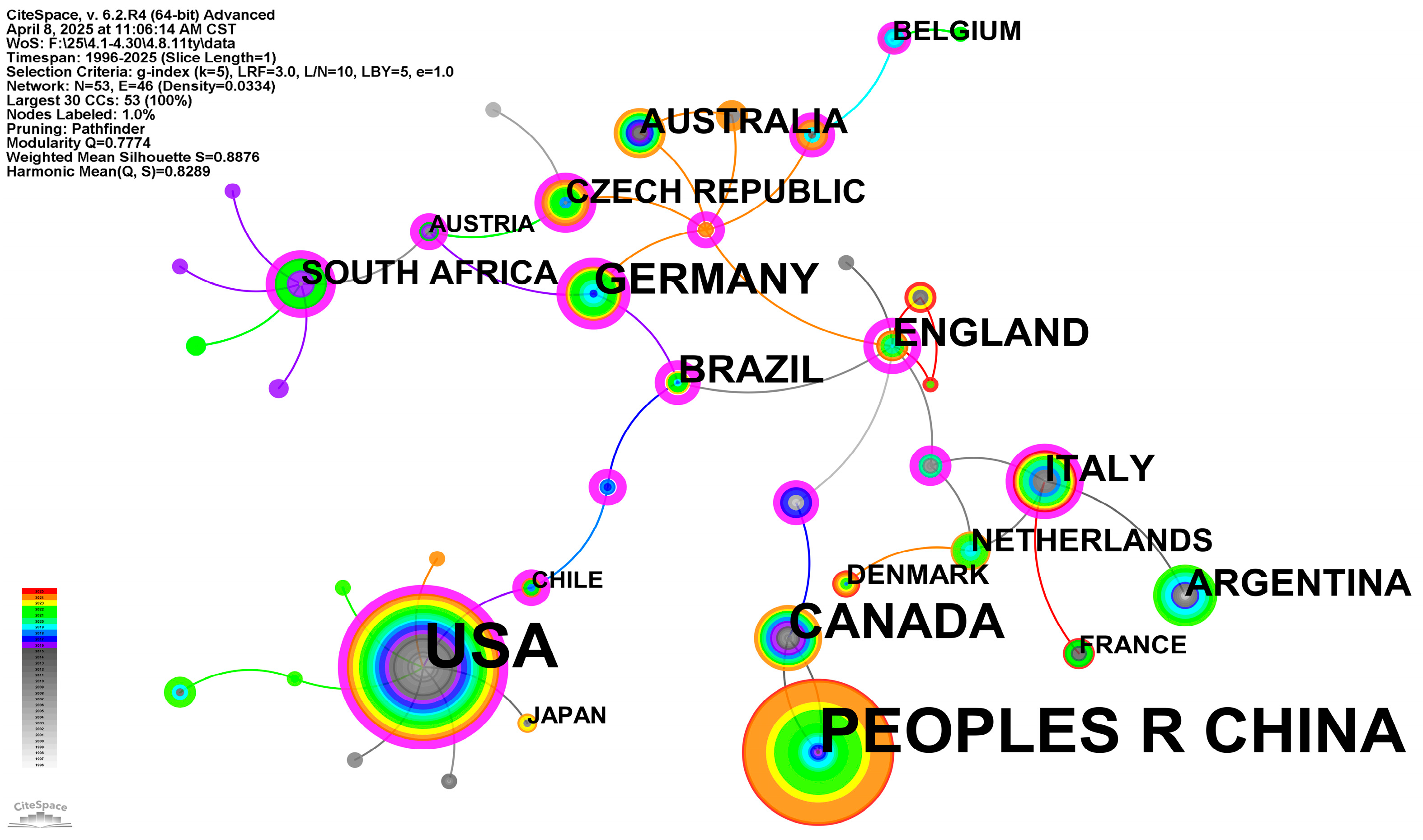
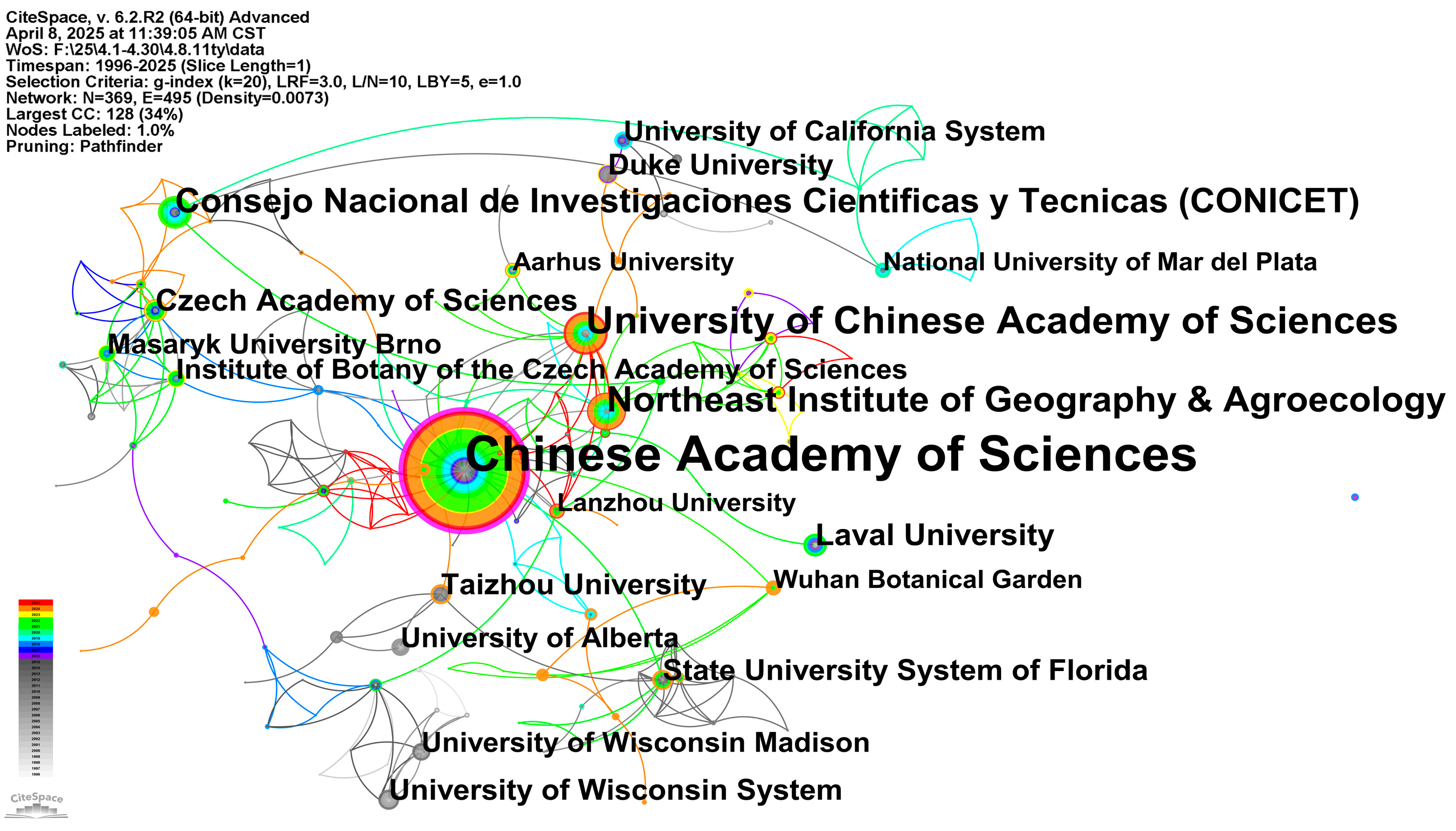
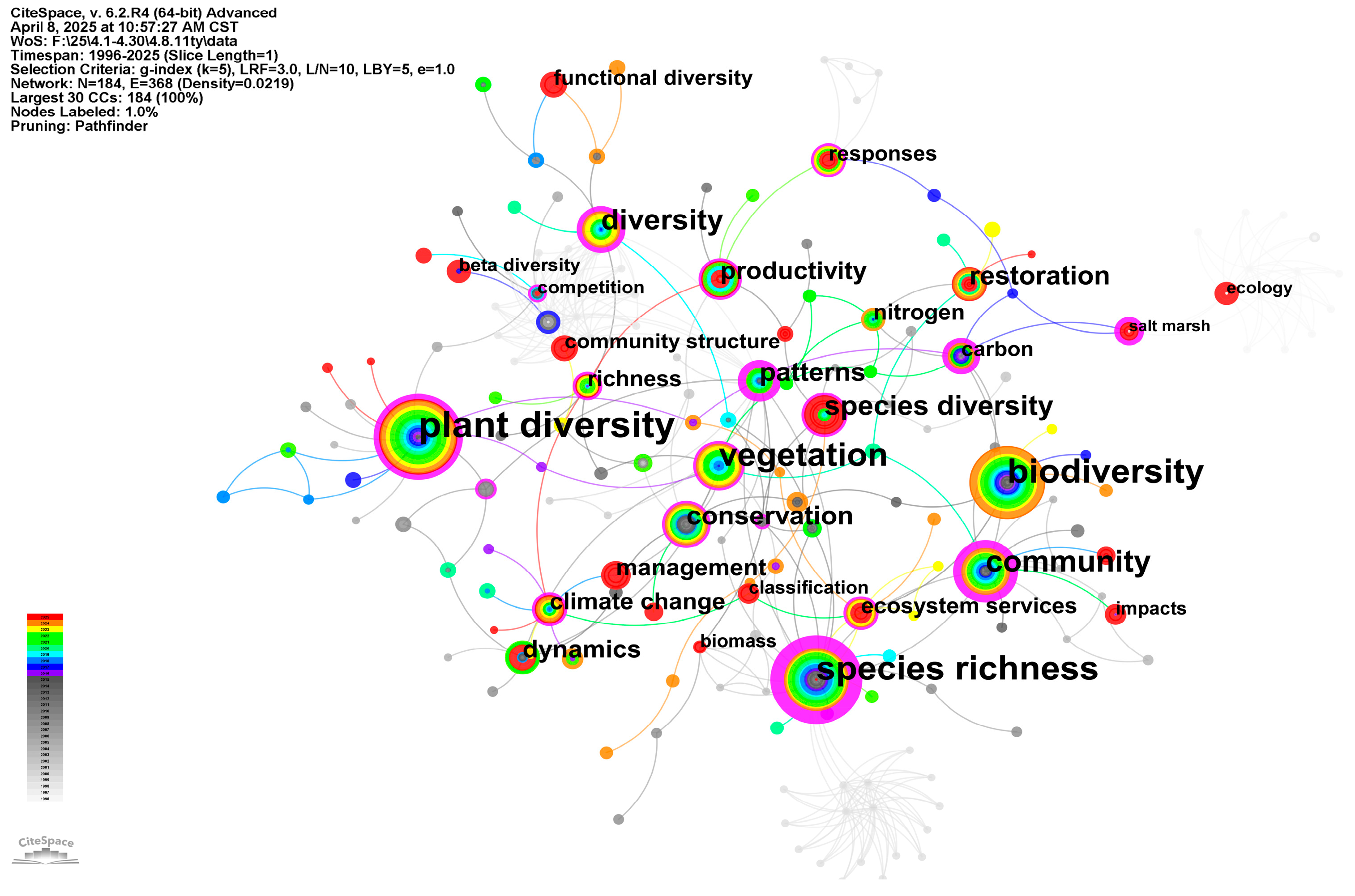
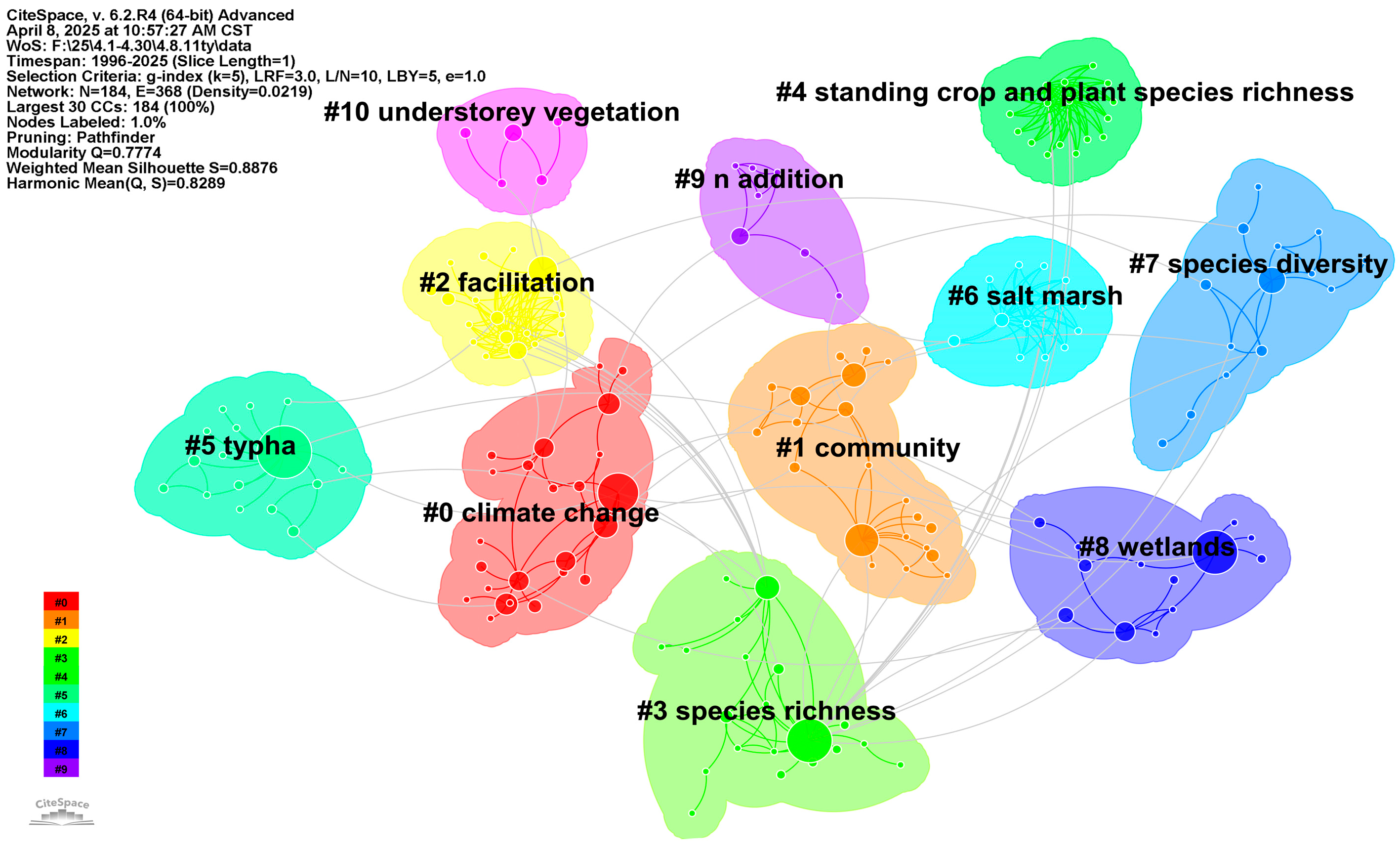
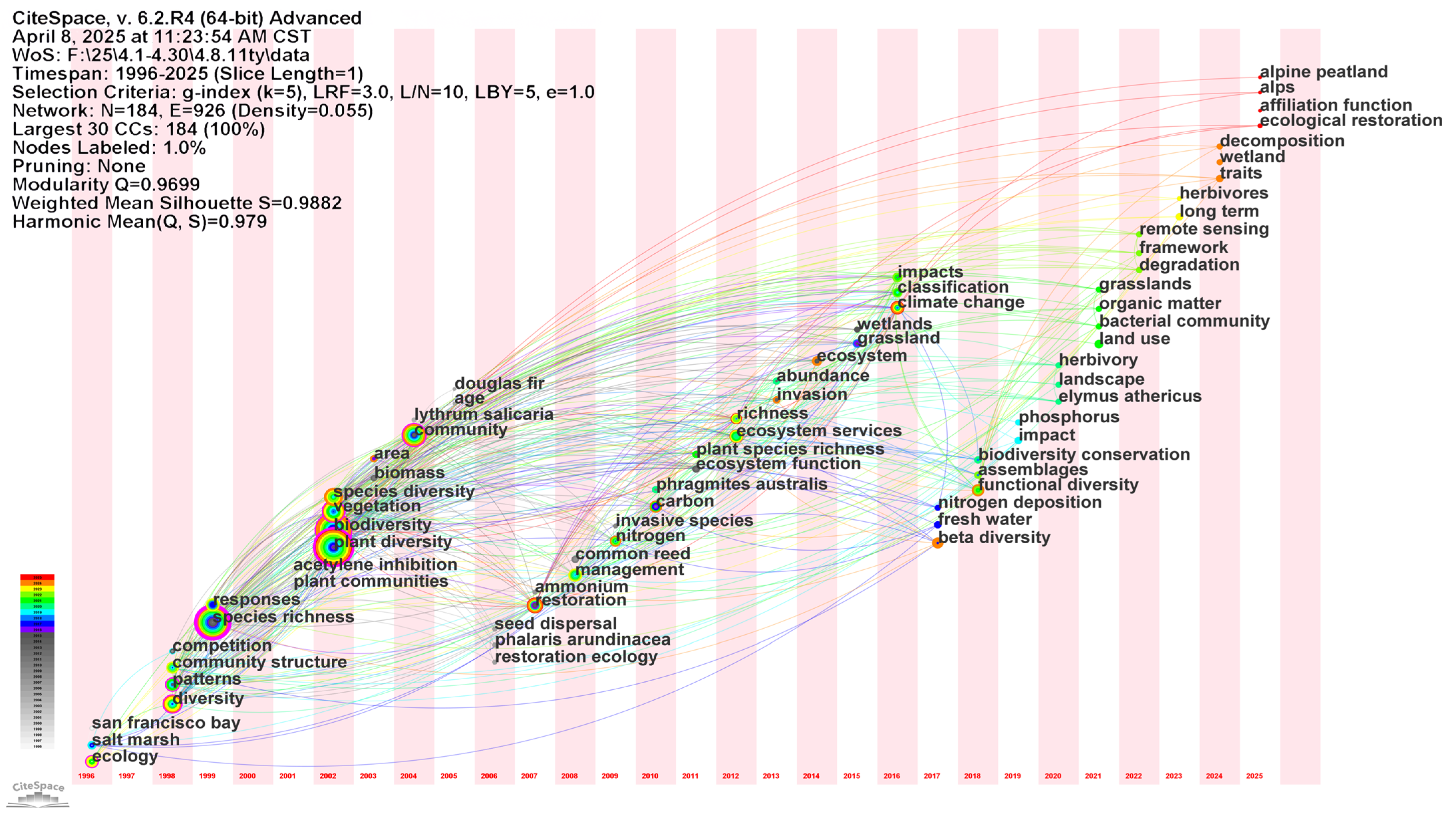
| Title | Year | Total Citations | Average Number of Citations Per Year | Reference |
|---|---|---|---|---|
| WETLAND RESOURCES: Status, Trends, Ecosystem Services, and Restorability | 2005 | 1479 | 73.95 | [4] |
| Recent assembly of the Cerrado, a neotropical plant diversity hotspot, by in situ evolution of adaptations to fire | 2009 | 774 | 48.38 | [47] |
| Temperate freshwater wetlands: types, status, and threats | 2002 | 414 | 18.00 | [48] |
| Patterns in Nutrient Availability and Plant Diversity of Temperate North American Wetlands | 1999 | 405 | 15.58 | [49] |
| Plant Species Richness in Riparian Wetlands—a Test of Biodiversity Theory | 1998 | 388 | 14.37 | [50] |
| Effects of macrophyte species richness on wetland ecosystem functioning and services | 2001 | 328 | 13.76 | [34] |
| Wetlands as large-scale nature-based solutions: Status and challenges for research, engineering and management | 2017 | 222 | 27.75 | [51] |
| Core Microbiota in Agricultural Soils and Their Potential Associations with Nutrient Cycling | 2019 | 178 | 29.67 | [52] |
| The effects of adjacent land use on wetland species richness and community composition | 2006 | 164 | 8.63 | [53] |
| Patterns of fungal diversity and composition along a salinity gradient | 2011 | 152 | 10.86 | [54] |
Disclaimer/Publisher’s Note: The statements, opinions and data contained in all publications are solely those of the individual author(s) and contributor(s) and not of MDPI and/or the editor(s). MDPI and/or the editor(s) disclaim responsibility for any injury to people or property resulting from any ideas, methods, instructions or products referred to in the content. |
© 2025 by the authors. Licensee MDPI, Basel, Switzerland. This article is an open access article distributed under the terms and conditions of the Creative Commons Attribution (CC BY) license (https://creativecommons.org/licenses/by/4.0/).
Share and Cite
Zhang, X.; Chen, S.; Yao, P.; Han, J.; Jin, R. Knowledge Structure and Evolution of Wetland Plant Diversity Research: Visual Exploration Based on CiteSpace. Biology 2025, 14, 781. https://doi.org/10.3390/biology14070781
Zhang X, Chen S, Yao P, Han J, Jin R. Knowledge Structure and Evolution of Wetland Plant Diversity Research: Visual Exploration Based on CiteSpace. Biology. 2025; 14(7):781. https://doi.org/10.3390/biology14070781
Chicago/Turabian StyleZhang, Xuanrui, Shikun Chen, Pengfu Yao, Jiahui Han, and Ri Jin. 2025. "Knowledge Structure and Evolution of Wetland Plant Diversity Research: Visual Exploration Based on CiteSpace" Biology 14, no. 7: 781. https://doi.org/10.3390/biology14070781
APA StyleZhang, X., Chen, S., Yao, P., Han, J., & Jin, R. (2025). Knowledge Structure and Evolution of Wetland Plant Diversity Research: Visual Exploration Based on CiteSpace. Biology, 14(7), 781. https://doi.org/10.3390/biology14070781






